2020 Acquisition Highlights
December 2020
Someone doing a superficial search of the OJA's collections might be forgiven for coming to the conclusion that Ontario's Jewish community consisted exclusively of Jews of Ashkenazi origin. That's because Jews of colour in general, and Black Jews in particular, are underrepresented in our holdings. As a result, Jews of colour growing up in Ontario are unlikely to see themselves reflected in their community's history. Associate professor Michelle Caswell of UCLA has even used the term symbolic annihilation to describe the ways in which members of marginalized communities find themselves absent from or misrepresented in archival collections. To rectify this situation, the OJA has prioritized collecting records created by Jews of colour. One success in this area has been the acquisition of two web pages featuring content by the members of No Silence on Race, a group that came into existence following the protests that were triggered by the murder of George Floyd in May 2020. The group, which currently consists of three members, addressed an open letter to the Jewish community to commit to the creation of an anti-racist Jewish community. An excerpt from the letter is reproduced below.

November 2020
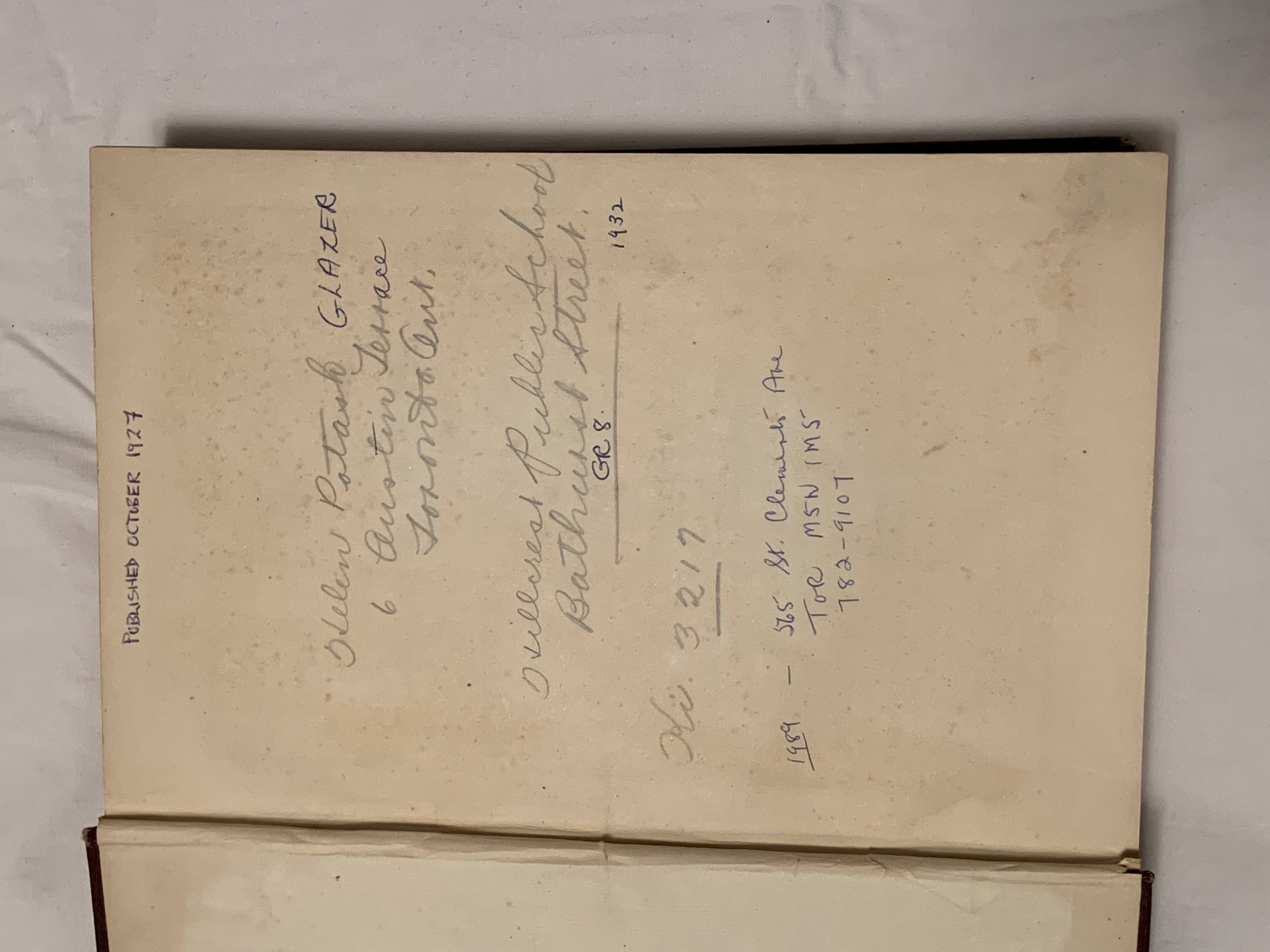 In November, Sam Glazer donated publications that belonged to his late mother, Helen Glazer. Helen was born in Toronto in 1919 to Melville Potash and Jennie Potash (née Kroch/Krocz). Helen received her BA in arts and sciences from University College at the University of Toronto in 1940. She married Albert E. Glazer (1918–2004) of Toronto, son of Sam Glazer and Anna Glazer (née Brandfeld/Brondfield). Albert and Helen had three children: Stephen, Karen, and Sam. Helen was an active member of Canadian Young Judaea's Toronto branch and Canadian Hadassah-WIZO. She passed away on Rosh Hashanah, 2020. Pictured here is the inscribed inside cover of a Hadassah publication that appears to have come out in 1927.
In November, Sam Glazer donated publications that belonged to his late mother, Helen Glazer. Helen was born in Toronto in 1919 to Melville Potash and Jennie Potash (née Kroch/Krocz). Helen received her BA in arts and sciences from University College at the University of Toronto in 1940. She married Albert E. Glazer (1918–2004) of Toronto, son of Sam Glazer and Anna Glazer (née Brandfeld/Brondfield). Albert and Helen had three children: Stephen, Karen, and Sam. Helen was an active member of Canadian Young Judaea's Toronto branch and Canadian Hadassah-WIZO. She passed away on Rosh Hashanah, 2020. Pictured here is the inscribed inside cover of a Hadassah publication that appears to have come out in 1927.
October 2020
In October, the OJA accepted a document that describes a unique project the members of Congregation Darchei Noam undertook in the midst of the pandemic. The project involved members fashioning little squares of material, each of which would represent his or her experience of the pandemic; when the pandemic is over, the squares will be sewed together to make a quilt that will be hung in the congregation as a reminder of these difficult times. Donor Miriam Bester, a participant in the project, described it this way: "Unable to meet in person at Darchei Noam, our community needed an outlet to express feelings and emotions about this unique time in our lives. The squares illustrate these feelings and also, provide our artists, with an opportunity to come together as a community, to create something larger than each individual contribution. It has been cathartic and energizing. We plan to sew them all together and display them at Darchei Noam when it is possible to do so." Below is an excerpt from the document that was donated.
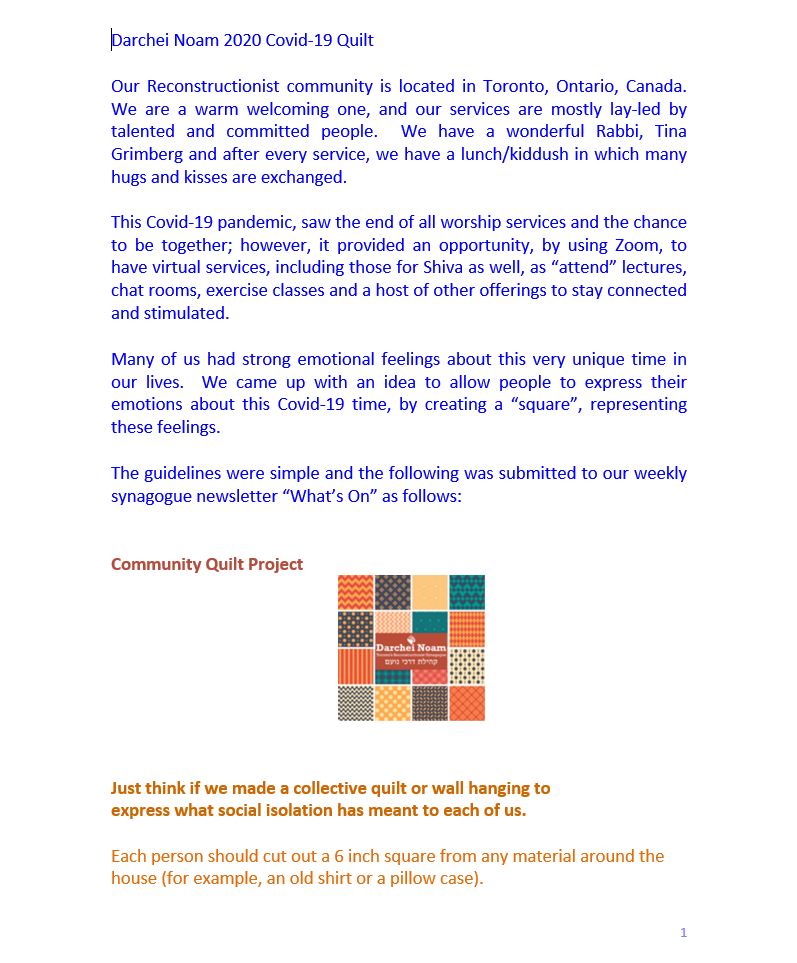
September 2020
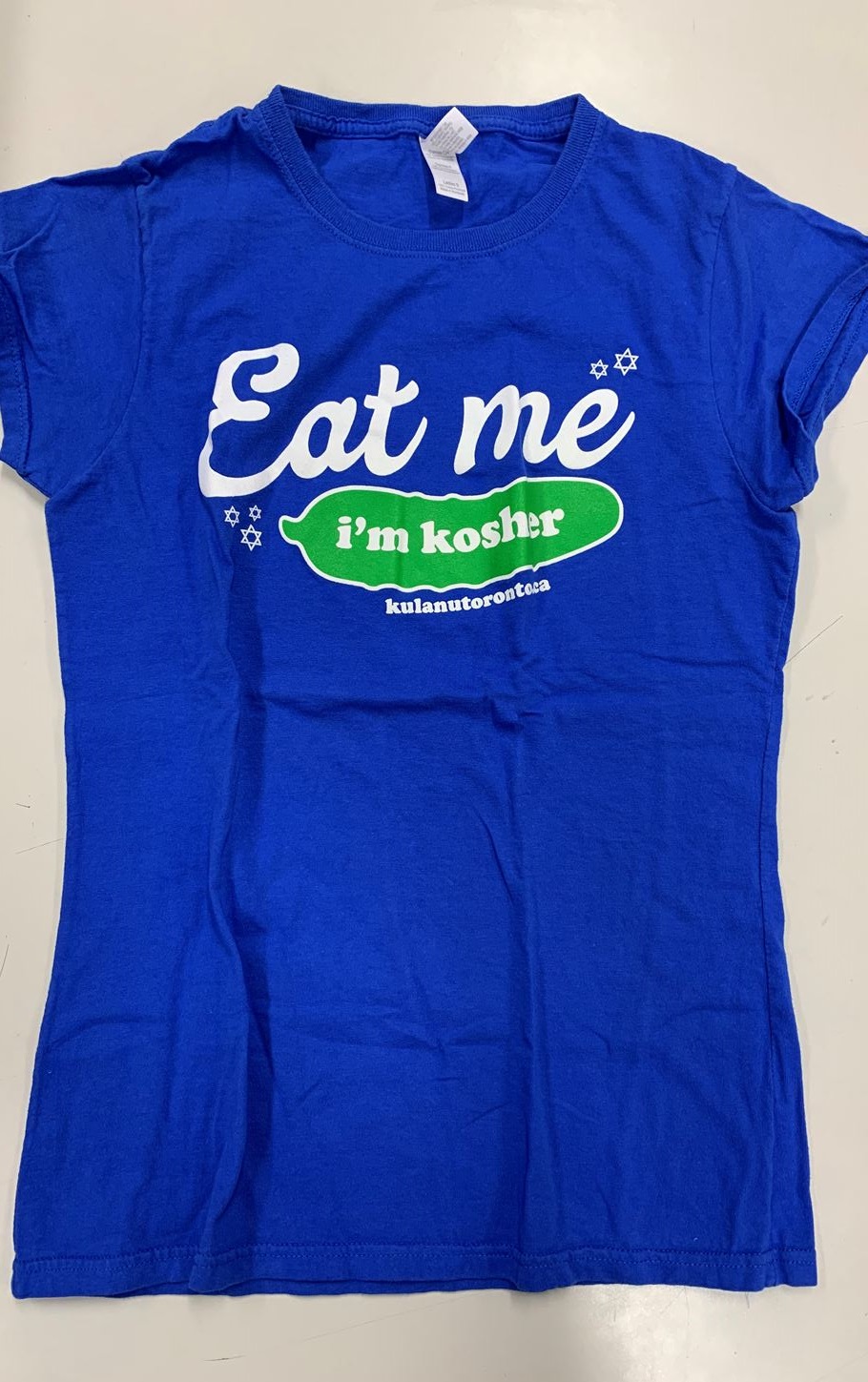 It's unusual for the OJA to acquire items of clothing. Articles of clothing, objects, and artifacts are typically the province of museums, which are better positioned to display the materials to an interested public. Thus, the OJA often turns down these types of items, but in September we made an exception. That's because Justine Apple, the former executive director of Kulanu Toronto, offered to donate eleven T-shirts to the OJA. The OJA began acquiring records from Kulanu Toronto back in 2018 as part of its efforts to document the province's Jewish LGBTQ+ community. During that process, the OJA acquired meeting minutes, correspondence, photographs, and many other records created by Kulanu Toronto. As this went on, Justine would often make reference to the group's T-shirts. These shirts, she explained, were not incidental to the group's primary activities; instead, they were central to how the group expressed its identity and displayed cohesion. Notably, Kulanu Toronto members and supporters can be seen marching at Pride wearing the shirts in photographs that the OJA had already taken in. Thanks to Justine's persistence, the OJA is now home to eleven of the group's T-shirts, including the one pictured here: "Eat me: I'm kosher!"
It's unusual for the OJA to acquire items of clothing. Articles of clothing, objects, and artifacts are typically the province of museums, which are better positioned to display the materials to an interested public. Thus, the OJA often turns down these types of items, but in September we made an exception. That's because Justine Apple, the former executive director of Kulanu Toronto, offered to donate eleven T-shirts to the OJA. The OJA began acquiring records from Kulanu Toronto back in 2018 as part of its efforts to document the province's Jewish LGBTQ+ community. During that process, the OJA acquired meeting minutes, correspondence, photographs, and many other records created by Kulanu Toronto. As this went on, Justine would often make reference to the group's T-shirts. These shirts, she explained, were not incidental to the group's primary activities; instead, they were central to how the group expressed its identity and displayed cohesion. Notably, Kulanu Toronto members and supporters can be seen marching at Pride wearing the shirts in photographs that the OJA had already taken in. Thanks to Justine's persistence, the OJA is now home to eleven of the group's T-shirts, including the one pictured here: "Eat me: I'm kosher!"
August 2020
If you want to start a spirited debate among a group of archivists, simply ask them, "What constitutes a record?" then watch the sparks fly! Is a photograph a record? Is a ticket stub a record? What about a ketubah? Along these same lines, one might ask, "Can a poem be a record?" We think so! In August, Florene Moscovitz contributed a poem to the OJA's COVID-19 Documentation Project. The poem, written in July that year, records the country's measures to contain the virus, but it does more than that: it records one individual's emotional response to those measures. To that extent, it's just as valuable, if not moreso, than a purely objective recording of what took place in the first several months of COVID-19. But perhaps it's best to let the poem speak for itself:
This global pandemic historians will not overlook
I personally keep the newspapers for a future scrapbook.
Many lessons to be learned, we must all take heed
For future generations not to concede.
One day we’ll reminisce with our family and friends
How every single obstacle pushed us to our wit’s end.
But then we should laugh and sing out loud
Our perseverance and tenacity should make us so proud.
July 2020
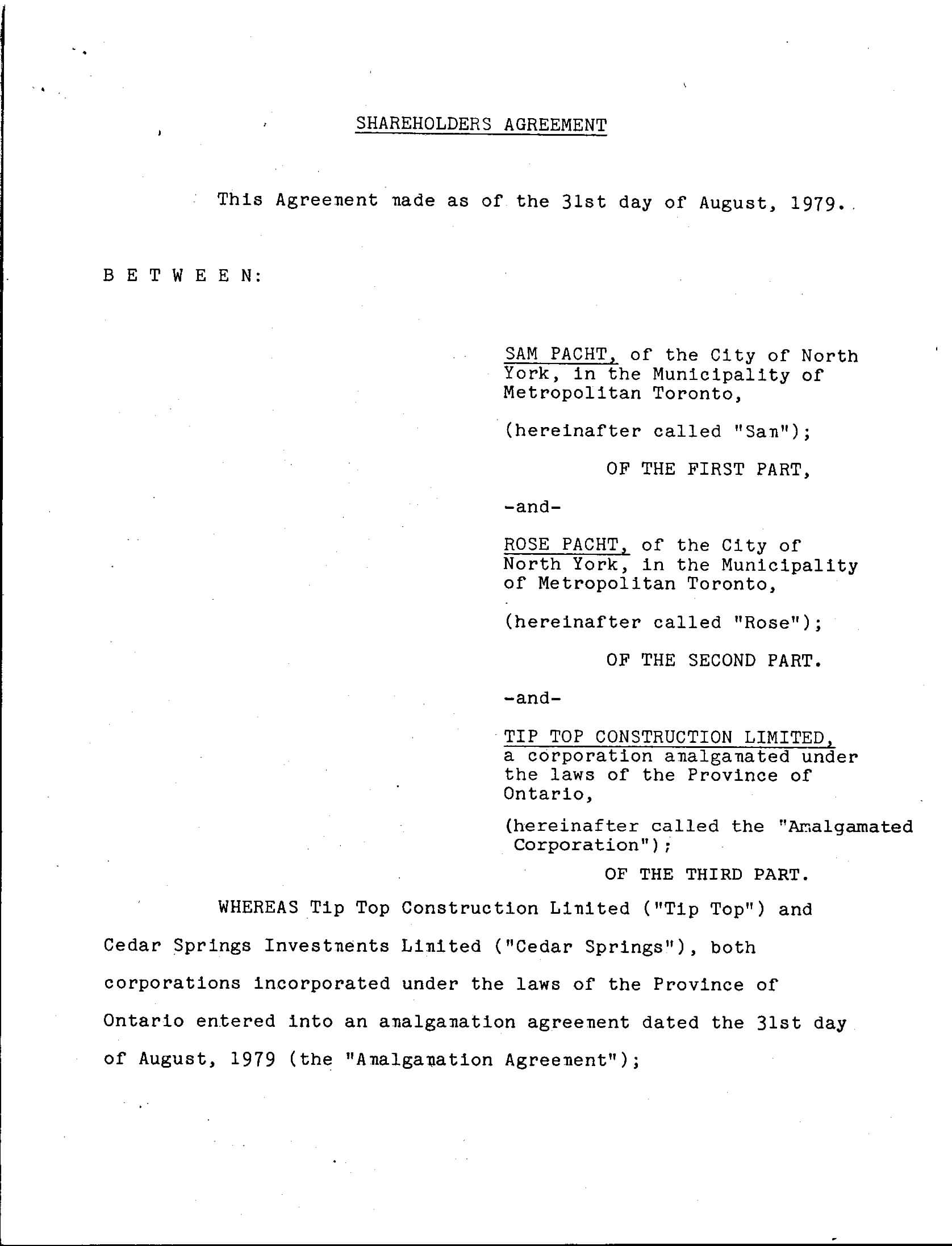 It isn't often that the OJA is able to acquire business records from the community. Business owners, especially small-business owners, are frequently preoccupied with the day-to-day challenges of running a business. To the extent they keep records, it's in order to meet their legal and financial obligations, not to preserve history for posterity. That's why the OJA was fortunate to acquire the records of Sam Pacht. Born in the predominantly Jewish village of Lanovits in 1918, Sam survived the Holocaust and immigrated to Canada in 1948. Initially working as a tailor, Sam ultimately went into building. He died in 2018 at the ripe young age of one hundred. Two years later, Sam's daughter, Lisa, donated her father's business records, which document Tip Top Construction Limited and Cedar Springs Construction. The OJA is delighted to be able to preserve a small part of Sam's legacy.
It isn't often that the OJA is able to acquire business records from the community. Business owners, especially small-business owners, are frequently preoccupied with the day-to-day challenges of running a business. To the extent they keep records, it's in order to meet their legal and financial obligations, not to preserve history for posterity. That's why the OJA was fortunate to acquire the records of Sam Pacht. Born in the predominantly Jewish village of Lanovits in 1918, Sam survived the Holocaust and immigrated to Canada in 1948. Initially working as a tailor, Sam ultimately went into building. He died in 2018 at the ripe young age of one hundred. Two years later, Sam's daughter, Lisa, donated her father's business records, which document Tip Top Construction Limited and Cedar Springs Construction. The OJA is delighted to be able to preserve a small part of Sam's legacy.
May 2020
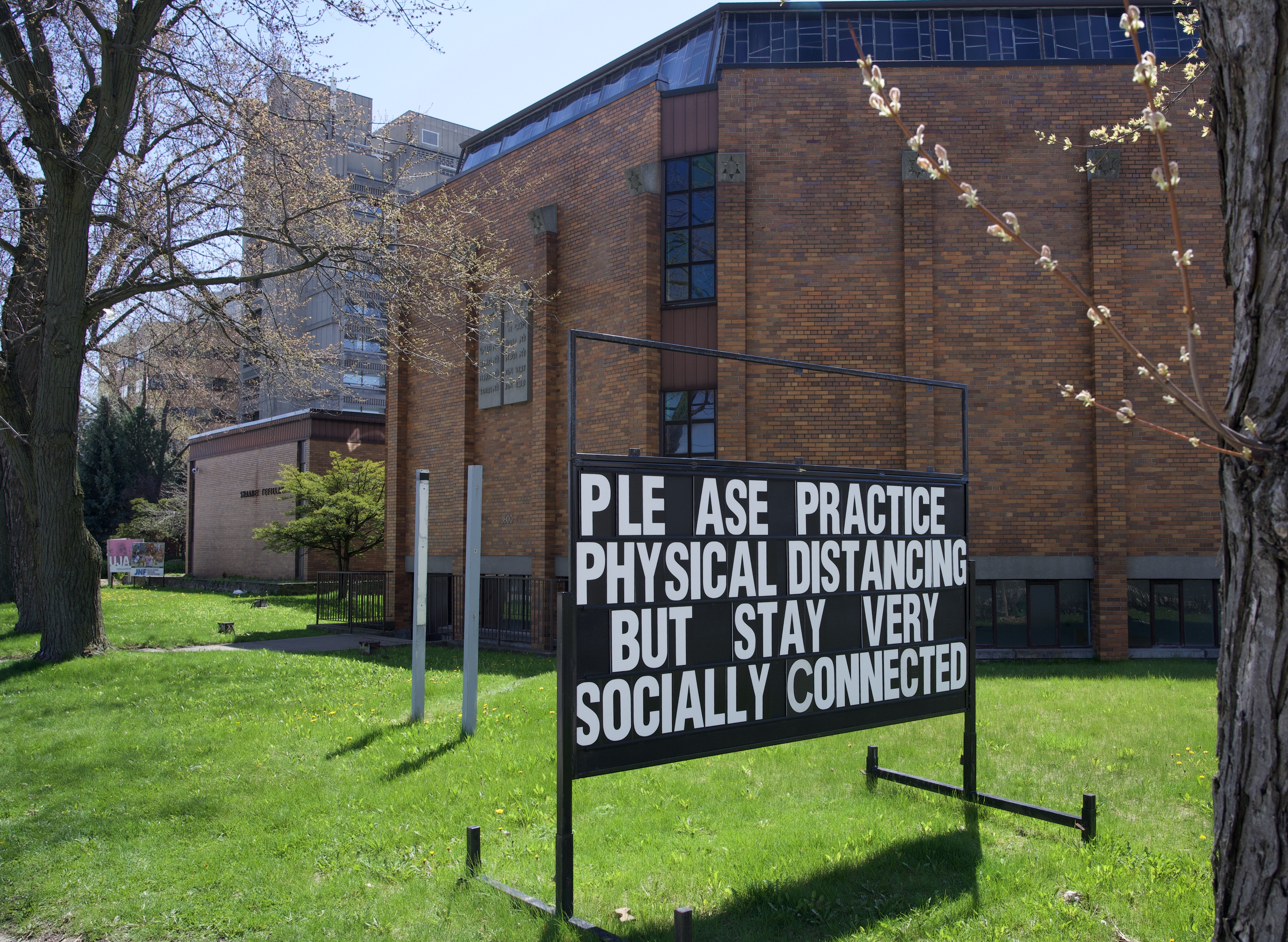 Responding to the COVID-19 Documentation Project, OJA volunteer Eric Bornstein photographed storefront signage in Jewish businesses and organizations in Lawrence Plaza and along Bathurst Street. These photographs, which Eric donated to the OJA in May, convey the sense of life put on hold, as storefront sign after storefront sign informs customers that the store is closed because of COVID-19. One cheerful message amidst this repetitive messaging comes from Shaarei Tefillah: "Please practice physical distancing," the synagogue's sign instructs, "but stay very socially connected."
Responding to the COVID-19 Documentation Project, OJA volunteer Eric Bornstein photographed storefront signage in Jewish businesses and organizations in Lawrence Plaza and along Bathurst Street. These photographs, which Eric donated to the OJA in May, convey the sense of life put on hold, as storefront sign after storefront sign informs customers that the store is closed because of COVID-19. One cheerful message amidst this repetitive messaging comes from Shaarei Tefillah: "Please practice physical distancing," the synagogue's sign instructs, "but stay very socially connected."
April 2020
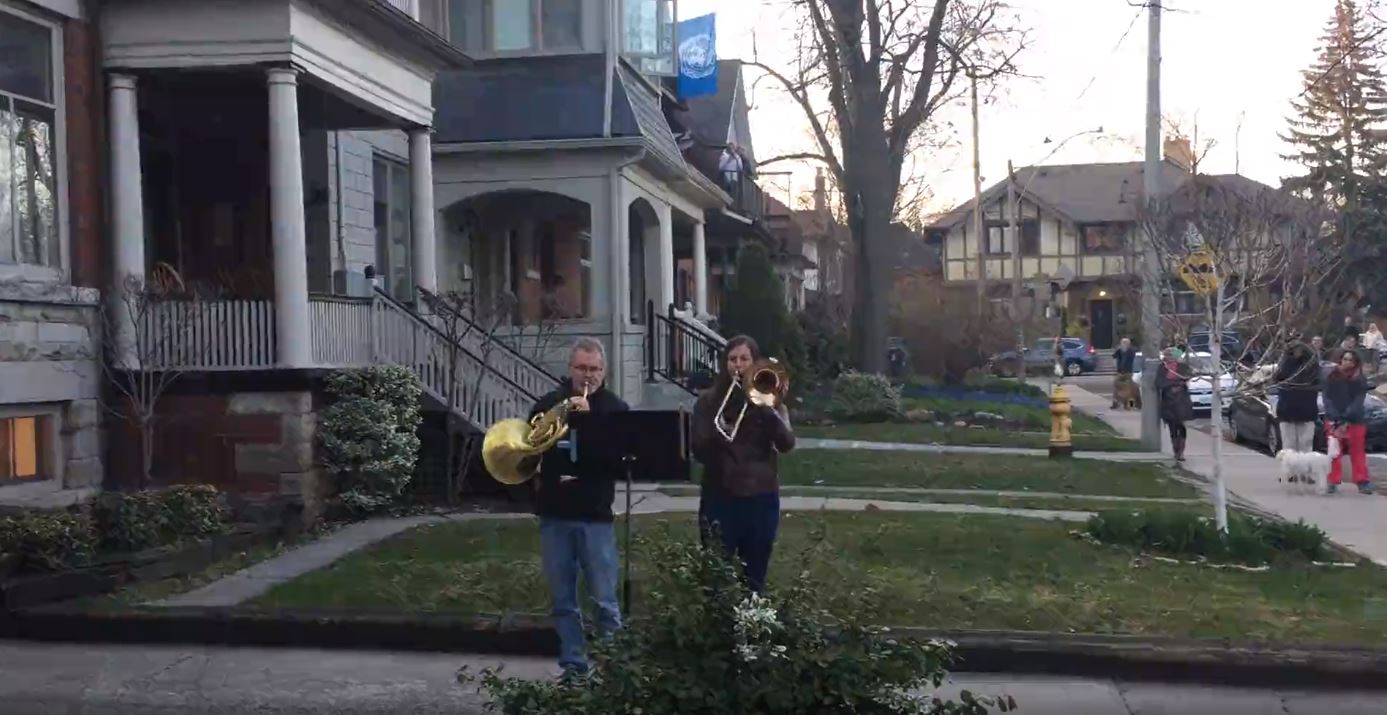 In April, Adam Seelig donated a video recording of himself and half a dozen other musicians performing "Eliyahu Hanavi" on Erev Pesach 2020. Adam offered this by way of background: "During the pandemic, two days after my son Arlo’s bar-mitzvah (via Zoom/screen), I started a band with my two kids (Shai 17 on Tuba, Arlo 13 on trumpet, I'm 44 on trombone) to cheer on frontliners and to cheer up the neighbourhood (plus ourselves). We were soon joined by two more horn players at a distance. Their other band? The Toronto Symphony Orchestra! And then another two. We call ourselves Horn on the Cob and the Social Distance and have played a newly arranged song from our front porch and yard every night at 7:30 pm for 50 nights in a row (as of May 9, 2020). Nomi Rotbard, my spouse, introduces and videos each night’s song. This one was special: I arranged Eliyahu Hanavi for Erev Pesach, April 8, 2020 - it was such a pleasure to share a Passover moment with our neighbourhood!"
In April, Adam Seelig donated a video recording of himself and half a dozen other musicians performing "Eliyahu Hanavi" on Erev Pesach 2020. Adam offered this by way of background: "During the pandemic, two days after my son Arlo’s bar-mitzvah (via Zoom/screen), I started a band with my two kids (Shai 17 on Tuba, Arlo 13 on trumpet, I'm 44 on trombone) to cheer on frontliners and to cheer up the neighbourhood (plus ourselves). We were soon joined by two more horn players at a distance. Their other band? The Toronto Symphony Orchestra! And then another two. We call ourselves Horn on the Cob and the Social Distance and have played a newly arranged song from our front porch and yard every night at 7:30 pm for 50 nights in a row (as of May 9, 2020). Nomi Rotbard, my spouse, introduces and videos each night’s song. This one was special: I arranged Eliyahu Hanavi for Erev Pesach, April 8, 2020 - it was such a pleasure to share a Passover moment with our neighbourhood!"
March 2020
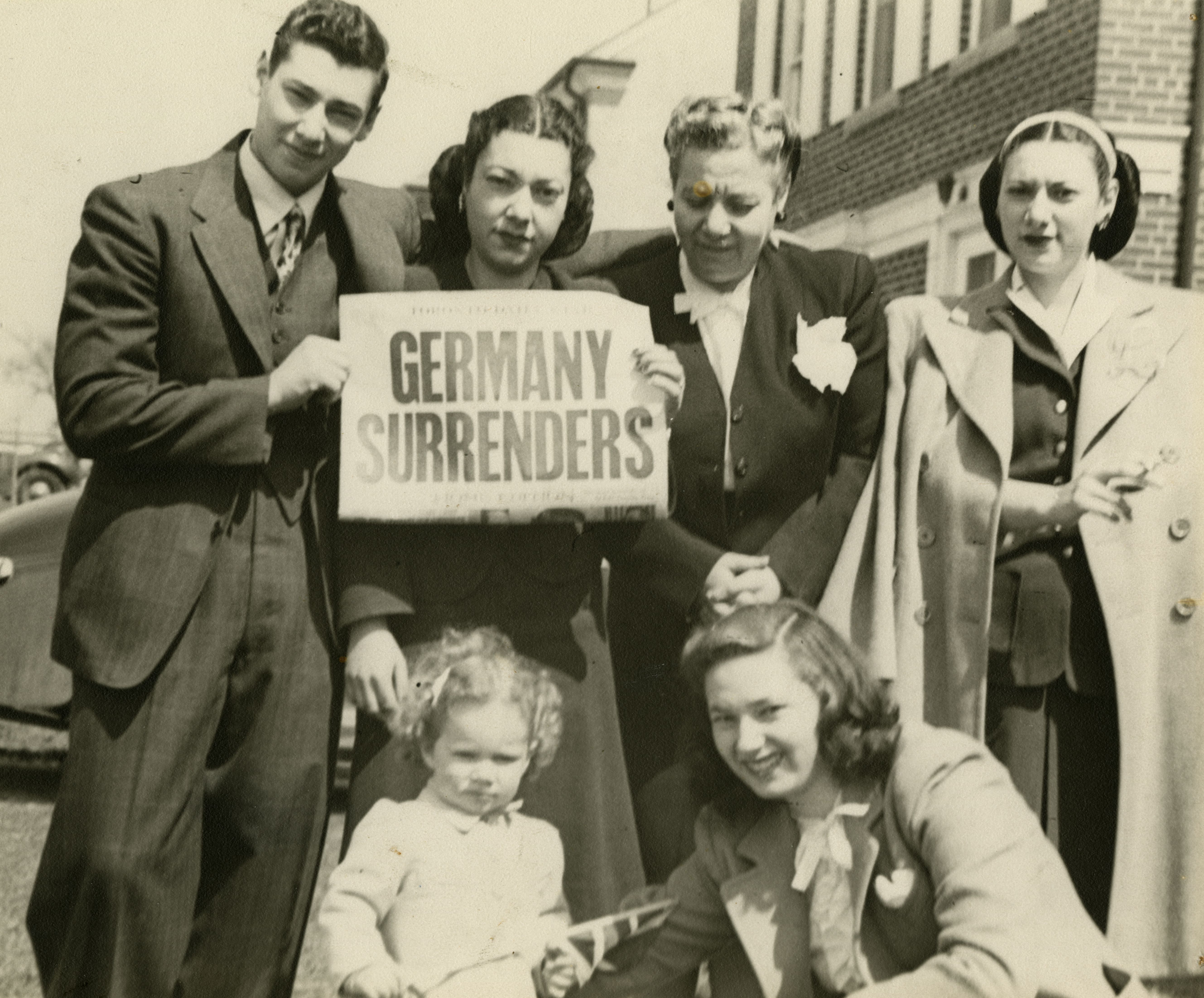 In March, Sharon Drache donated two photographs documenting her family. The photograh shown here is titled "German Surrenders" and was taken by Murray Abramowitz, the father of the donor, in front of the family home at 27 Forest Ridge Drive. The photograph shows the donor's uncle Murray Levinter and mother, Edythe Levinter Abron, holding a newspaper with the headline "Germany Surrenders." Standing next to Edythe is the donor's maternal grandmother Sara Levinter (née Kamin). Next to Sara is the donor's aunt Molly, a well-known pianist in Toronto. Lastly, there is two-year-old Sharon Abron Drache who is holding hands with her aunt Florence.
In March, Sharon Drache donated two photographs documenting her family. The photograh shown here is titled "German Surrenders" and was taken by Murray Abramowitz, the father of the donor, in front of the family home at 27 Forest Ridge Drive. The photograph shows the donor's uncle Murray Levinter and mother, Edythe Levinter Abron, holding a newspaper with the headline "Germany Surrenders." Standing next to Edythe is the donor's maternal grandmother Sara Levinter (née Kamin). Next to Sara is the donor's aunt Molly, a well-known pianist in Toronto. Lastly, there is two-year-old Sharon Abron Drache who is holding hands with her aunt Florence.
February 2020
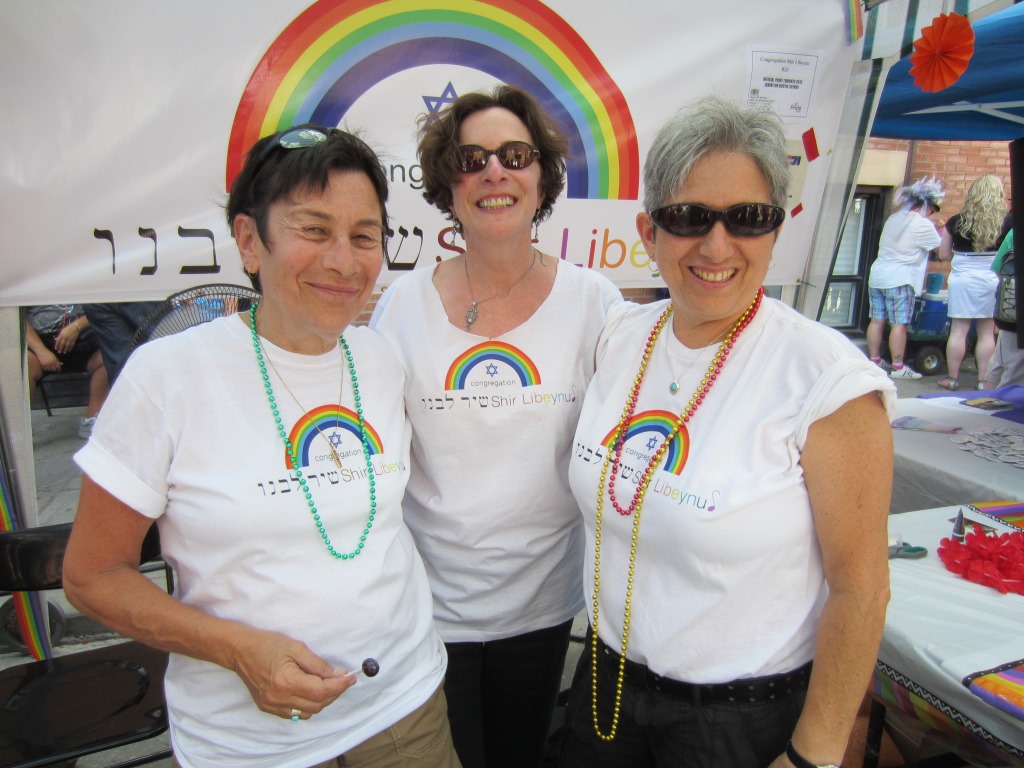 In February, Shlomo Gleibman donated three folders worth of digital records documenting his time volunteering with Kulanu Toronto, Shir Libeynu, and Miles Nadal JCC, all of which offered programs for Jewish LGBTQ individuals and families. The photograph to the left shows Rabbi Aviva Goldberg and two unidentified women wearing Pride-themed Congregation Shir Libeynu T-shirts. The date of the photograph is uncertain.
In February, Shlomo Gleibman donated three folders worth of digital records documenting his time volunteering with Kulanu Toronto, Shir Libeynu, and Miles Nadal JCC, all of which offered programs for Jewish LGBTQ individuals and families. The photograph to the left shows Rabbi Aviva Goldberg and two unidentified women wearing Pride-themed Congregation Shir Libeynu T-shirts. The date of the photograph is uncertain.
January 2020
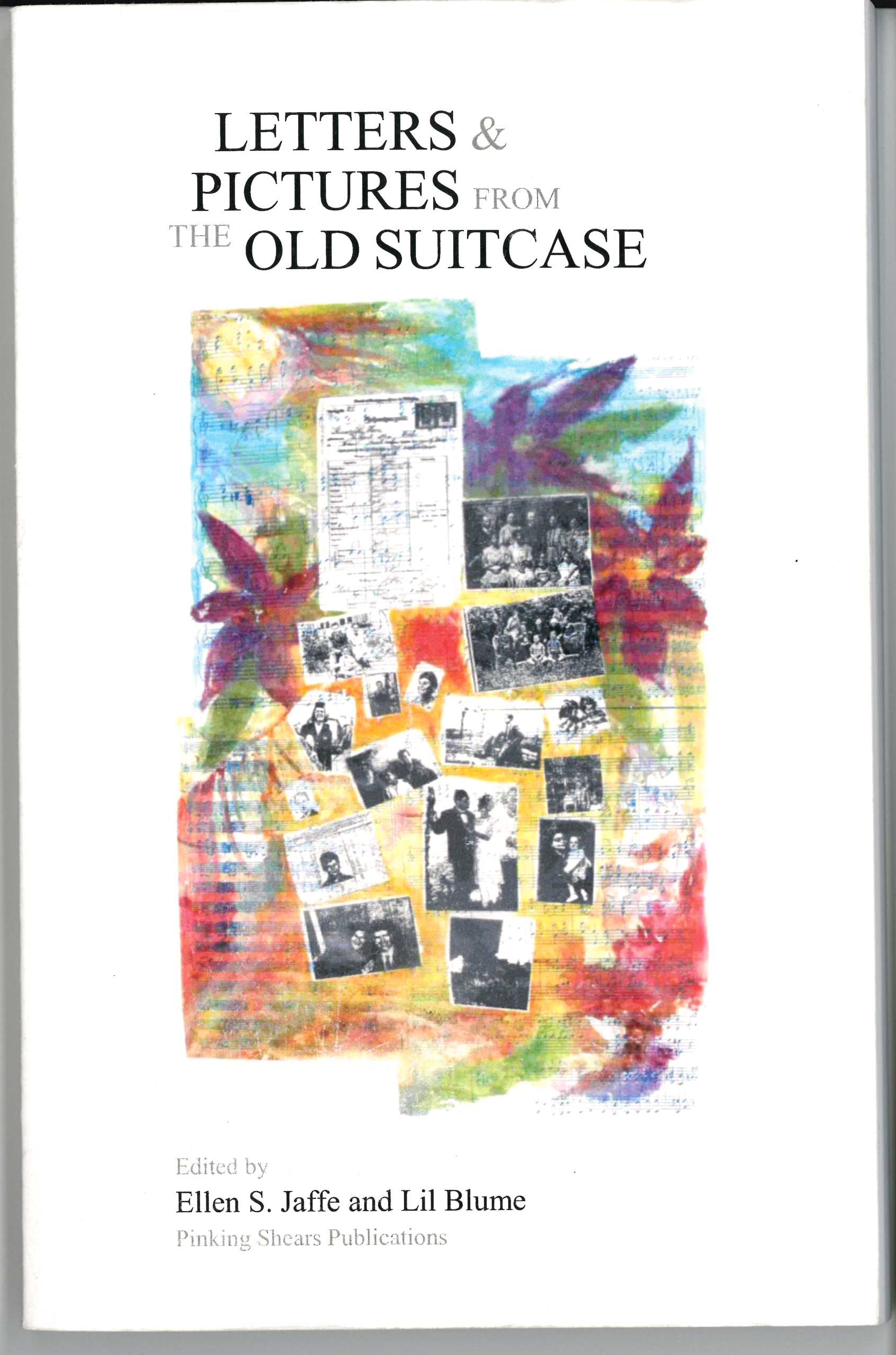
In January, Lil Blume donated materials for an anthology called Letters and Pictures from the Old Suitcase. The anthology was published in 2011 for a Jewish literary festival that Lil Blume ran in 2010. Included in the collection are handwritten autobiographical pages and photocopied pages from Miriam Beckerman. In addition, there are two photocopies of a 1959 letter to the Irgun regarding redirecting of reparations due to Moshe Beckerman. The document provides a summary of Moshe Beckerman's wartime experience including enlistment with the British military serving with the Regiment of Royal Engineers (1940), transfer to Greece (1941), capture by Germans (1941), escape and recapture in Italy, and eventual internment in Minchen and then Danzig prior to his release in 1945 by the Second British Army.